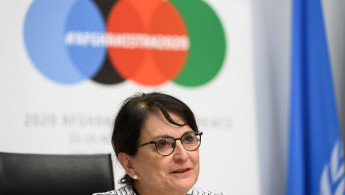UN names new deputy representative for Afghanistan, no word yet on a top envoy
The United Nations on Friday announced a new deputy special representative for Afghanistan, but it's unclear how soon the world body may replace its top official there.
For now, the newly appointed political affairs deputy, German diplomat Markus Potzel, will be in charge of the UN's political mission in Afghanistan, UN deputy spokesperson Farhan Haq said.
The announcement came a day after Deborah Lyons ended her tenure as the UN's chief representative in Afghanistan, departing with a lament for a country that was reshaped by Taliban militants' takeover last year.
"I could not have imagined, when I accepted this job, the Afghanistan that I am now leaving," she said in a statement Thursday, adding that "my heart breaks" for Afghan girls and women kept from school and work because of Taliban edicts.
"It is that much more painful, as a woman, to leave my Afghan sisters in the condition they are in," she said.
Haq declined to give a timeline for naming a successor for Lyons, who took the job in 2020.
Potzel, a career diplomat, served as Germany's ambassador to Afghanistan from 2014 to 2016 and his country's special representative for Afghanistan and Pakistan from 2017 into last year. He's fluent in multiple languages, including Dari, one of Afghanistan’s official languages.
After enduring years of war and drought, Afghanistan hurtled into crisis when the Taliban gained control last August as the US and NATO forces were withdrawing from the country they had invaded two decades earlier.
The Taliban quickly started enforcing strict measures, including edicts requiring women to cover their faces except for their eyes in public and banning girls from attending school past the sixth grade.
Amid international sanctions, the Afghan economy collapsed, and millions of people fell into poverty. The U.N. and other aid agencies have been struggling to raise the $4.4 billion they said was needed for humanitarian aid in Afghanistan this year.
Meanwhile, bombings and other attacks on civilians have persisted. A bitter Taliban rival - the Islamic State group’s Afghanistan affiliate - has claimed responsibility for most of the attacks.





 Follow the Middle East's top stories in English at The New Arab on Google News
Follow the Middle East's top stories in English at The New Arab on Google News
![The UAE is widely suspected of arming the RSF militia [Getty]](/sites/default/files/styles/image_330x185/public/2024-11/GettyImages-472529908.jpg?h=69f2b9d0&itok=Yauw3YTG)
![Netanyahu furiously denounced the ICC [Getty]](/sites/default/files/styles/image_330x185/public/2024-11/GettyImages-2169352575.jpg?h=199d8c1f&itok=-vRiruf5)
![Both Hamas and the Palestinian Authority welcomed the ICC arrest warrants [Getty]](/sites/default/files/styles/image_330x185/public/2024-11/GettyImages-2178351173.jpg?h=199d8c1f&itok=TV858iVg)